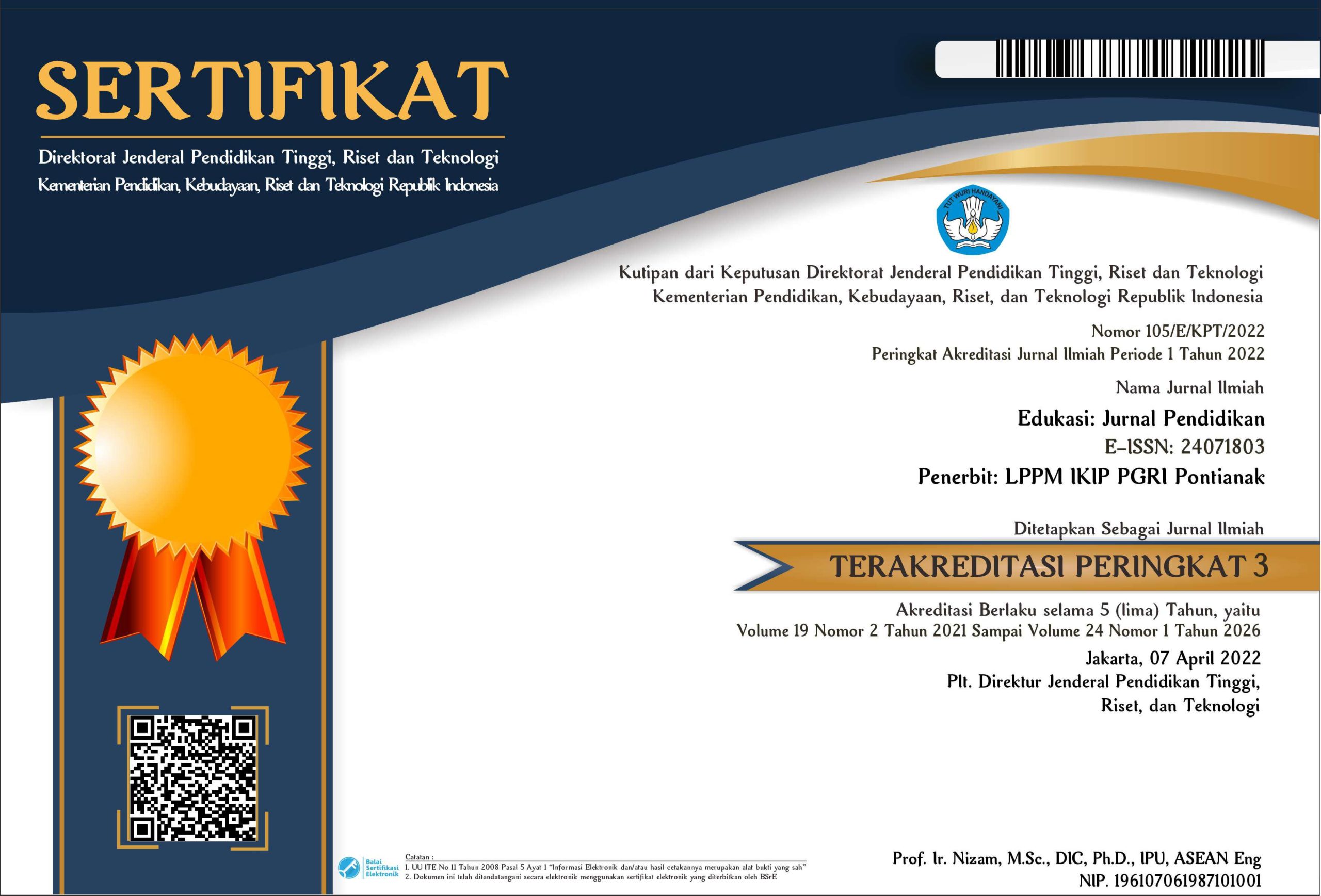Patriotisme Buta dan Konstruktif dalam Pendidikan Sejarah Berwawasan Kebangsaan
DOI:
https://doi.org/10.31571/edukasi.v20i2.4430Keywords:
pembelajaran sejarah berwawasan kebangsaan, patriotisme, penyelidikan sejarah, national history learning, patriotism, historical inquiryAbstract
Abstrak
Pembelajaran sejarah yang hanya bertumpu pada satu buku teks rentan dimanfaatkan oleh pihak penguasa. Pembelajaran sejarah dimonopoli demi realitas intersubjektif berupa kebanggaan dan kesetiaan terhadap penguasa yang biasanya berkaitan dengan penghapusan sejarah mengenai apa yang disebut masa kelam di masa lalu dan peran vital minoritas dalam bangsa. Pembelajaran sejarah berwawasan kebangsaan tidak harus meniscayakan adanya loyalitas yang membutakan objektivitas dan menghapus sikap kritis terhadap bangsa. Peristiwa yang dianggap kelam tidak boleh dilupakan. Keberadaan kaum minoritas dalam pembangunan bangsa tidak boleh disembunyikan dari pembelajaran sejarah. Narasi mengenai peran pihak minoritas dalam pembelajaran sejarah dapat digunakan untuk menjaga kohesi dan persatuan agar menjadi lebih kuat. Kajian yang dilakukan membahas bagaimana pembelajaran sejarah nasional harus diwujudkan tanpa menimbulkan kebencian. Pembelajaran sejarah nasional juga harus memberikan kesadaran akan pentingnya mempelajari peristiwa kelam di masa lalu untuk dijadikan perbaikan dan melakukan langkah-langkah progresif bagi anak bangsa di masa depan.
Â
Â
Abstract
History learning relying on only one textbook is susceptibly utilized by the ruling party. History learning is monopolized for the sake of an intersubjective reality in the form of pride and loyalty toward the ruler, which usually coincides with the elimination of history regarding the so-called dark times in the past and the vital role of minorities in the nation. History learning with the national perspective should not necessitate the existence of a type of loyalty that blinds objectivity and erases a critical standpoint toward the nation. Therefore, events considered dark should not be forgotten. Likewise, the existence of minority people in nation-building should not be hidden from historical learning. Because the narrative regarding the role of minority parties in history learning can be used to maintain social cohesion and unity to become stronger. This article, through conducting a literature study, discusses how national history learning should be realized without creating hatred, and simultaneously should provide awareness of the importance of studying dark events in the past to get improvement and commit new progressive steps for the nation's children in the future.
Downloads
References
Apple, M. (2018). Ideology and Curriculum. Oxfordshire: Routledge.
Arthur, J. (2012). Issues in History Teaching. Oxfordshire: Routledge.
Aziz, M. (2018). Merawat Kebinekaan. Jakarta: Elex Media Komputindo.
Barnes, C. D., Pomerantz, A., & Yashko, L. (2016). Children Cover Your Eyes: Masculine Honor and the Role of Blind Patriotism in Teaching National Allegiance to Posterity. Political Psychology, 37(6), 817-834.
Baumeister, R. F., & Leary, M. R. (1997). Writing Narrative Literature Reviews. Review of General Psychology, 1(3), 311-320. https://doi.org/10.1037/1089-2680.1.3.311.
Bryant, R. (2001). An Aesthetics of Self: Moral Remaking and Cypriot Education. Comparative Studies in Society and History, 43(3), 583-614.
Christou, M. (2007). The Language of Patriotism: Sacred History and Dangerous Memories. British Journal of Sociology of Education, 28(6), 709-722. https://doi.org/10.1080/01425690701609946.
Delap, L., & Morgan, S. (2013). Men, Masculinities and Religious Change in Twentieth-Century Britain. Berlin: Springer.
Dreeben, R. (2002). On What is Learned in School. Boston: Addison Wesley Publishing Company.
Durkheim, E. (2013). The Division of Labor in Society. New York: Free Press.
Durkheim, E. (1961). Moral Education. New York: Free Press.
Ercan, H. (2017). Self-Construal and Demographic Variables as Predictors of Blind and Constructive Patriotism in University Students. International Journal of Higher Education, 6(6), 170-179. https://doi.org/10.5430/ijhe.v6n6p170.
Finell, E., & Stevenson, C. (2022). Interpersonal Bonds with Fellow Nationals, Blind Patriotism and Preference for Immigrants’ Acculturation. Scandinavian Journal of Psychology, 63(4), 383-392. https://doi.org/10.1111/sjop.12817.
Finell, E., & Zogmaister, C. (2015). Blind and Constructive Patriotism, National Symbols and Outgroup Attitudes. Scandinavian Journal of Psychology, 56(2), 189-197. https://doi.org/10.1111/sjop.12193.
Foulcher, K. (2010). State Terrorism and Political Identity in Indonesia: Fatally Belonging. Sojourn: Journal of Social Issues in Southeast Asia, 25(1), 139-142. https://doi.org/10.4324/9780203099827.
Fukuoka, K. (2018). Japanese History Textbook Controversy at a Crossroads?: Joint History Research, Politicization of Textbook Adoption Process, and Apology Fatigue in Japan. Global Change, Peace & Security, 30(3), 313-334. https://doi.org/10.1080/14781158.2018.1501012.
Garrison, J., Neubert, S., & Reich, K. (2015). Democracy and Education Reconsidered: Dewey After One Hundred Years. Oxfordshire: Routledge.
Gewirtz, J. L., Kurtines, W. M., & Lamb, J. L. (2013). Intersections with Attachment. London: Psychology Press.
Guex, S. (2015). The History Textbook Controversy in Japan and South Korea. Cipango-French Journal of Japanese Studies. 4(2015), 1-20. https://doi.org/10.4000/cjs.968.
Hansen, D. T. (2012). John Dewey and Our Educational Prospect: A Critical Engagement with Dewey’s Democracy and Education. New York: SUNY Press.
Harari, Y. N. (2015). Homo Deus: A Brief History of Tomorrow. New York: HarperCollins Publisher.
Harjatanaya, T. Y., & Hoon, C.-Y. (2020). Politics of Multicultural Education in Post-Suharto Indonesia: A Study of the Chinese Minority. Compare: A Journal of Comparative and International Education, 50(1), 18-35. https://doi.org/10.1080/03057925.2018.1493573.
Hopkins, N. (2018). Dewey, Democracy and Education, and the School Curriculum. Education 3-13, 46(4), 433-440. https://doi.org/10.1080/03004279.2018.1445477.
Ikkos, G., & McQueen, D. (2019). Reflections on the Elementary Forms of Religious Life–Reflections. The British Journal of Psychiatry, 214(5), 304-305. https://doi.org/10.1192/bjp.2019.71.
Josias, A. (2011). Toward an Understanding of Archives as a Feature of Collective Memory. Archival Science, 11(1), 95-112. https://doi.org/10.1007/s10502-011-9136-3.
Lee, P., & Ashby, R. (2000). Progression in Historical Understanding among Students Ages 7-14 in Knowing, Teaching, and Learning History: National and International Perspectives. New York: New York University Press.
Madan, A. (2010). Emile Durkheim on Moral Education. Contemporary Education Dialogue, 7(2), 225-248. https://doi.org/10.1177/0973184913411211.
Martin, L. A. (2012). Blind Patriotism or Active Citizenship? How do Students Interpret the Pledge of Allegiance? Action in Teacher Education, 34(1), 55-64. https://doi.org/10.1080/01626620.2012.642288.
McLaren, P. (2015). Life in Schools: An Introduction to Critical Pedagogy in the Foundations of Education. Oxfordshire: Routledge.
Nora, P. (1989). Between Memory and History: Les Lieux de Mémoire. Representations, 26(Special Issue), 7-24. https://doi.org/10.2307/2928520.
Olick, J. K., Vinitzky-Seroussi, V., & Levy, D. (2011). The Collective Memory Reader. Oxford: Oxford University Press.
Osler, A. (2009). Patriotism, Multiculturalism and Belonging: Political Discourse and the Teaching of History. Educational Review, 61(1), 85-100. https://doi.org/10.1080/00131910802684813.
Öztürk, F., Malkoc, S., & Ersoy, A. F. (2016). Patriotism as Perceived by Social Studies Teachers: An Outlook on the Individual, Society and Education. Pamukkale Universitesi Eğitim Fakültesi Dergisi-Pamukkale University Journal of Education, 2016(40), 205-218. https://dx.doi.org/10.9779/PUJE803.
Parsons, T. (2017). The School Class as a Social System: Some of Its Functions in American Society. In Exploring Education. Oxfordshire: Routledge.
Rajilun, M. (2019). The Use of Local Character’s Biography to Build Nationalism and Patriotism. International Journal Pedagogy of Social Studies, 4(1), 41-50. https://doi.org/10.17509/ijposs.v4i1.15975.
Remnick, D. (1994). Lenin’s Tomb: The Last Days of the Soviet Empire. New York: Vintage.
Salevouris, M. J. (2015). The Methods and Skills of History: A Practical Guide. New York: John Wiley & Sons.
Schatz, R T. (2018). A Review and Integration of Research on Blind and Constructive Patriotism. In Handbook of patriotism. New York: Springer. https://doi.org/10.1007/978-3-319-30534-9.
Schatz, R. T. (2020). A Review and Integration of Research on Blind and Constructive Patriotism. In Handbook of Patriotism. New York: Springer. https://doi.org/10.1007/978-3-319-30534-9_30-1.
Smith, A. D., & Smith, A. (2013). Nationalism and Modernism. Oxfordshire: Routledge.
Snyder, H. (2019). Literature Review as a Research Methodology: An Overview and Guidelines. Journal of Business Research, 104(11), 333-339. https://doi.org/10.1016/j.jbusres.2019.07.039.
Staub, E. (1992). The Roots of Evil: The Origins of Genocide and Other Group Violence. Cambridge: Cambridge University Press.
Stearns, P. N., Seixas, P., & Wineburg, S. (2000). Knowing, Teaching, and Learning History. In National and International Perspectives. New York: NYU Press.
Tranfield, D., Denyer, D., & Smart, P. (2003). Towards a Methodology for Developing Evidenceâ€Informed Management Knowledge by Means of Systematic Review. British Journal of Management, 14(3), 207-222. https://doi.org/10.1111/1467-8551.00375.
van-der-Ploeg, P. (2016). Dewey Versus ‘Dewey’on Democracy and Education. Education, Citizenship and Social Justice, 11(2), 145-159. https://doi.org/10.1177/1746197916648283.
Whitaker, E. (2012). Stalin’s Resurrection’. London: History Today Ltd.
Yazıcı, F. (2022). The Values Predicting Patriotism Attitudes in Turkey. Current Psychology, 41(1), 135-145.
Yuval-Davis, N. (2014). Intersectionality, Citizenship and Contemporary Politics of Belonging. In Contesting citizenship. Oxfordshire: Routledge.
Downloads
Published
How to Cite
Issue
Section
License
Authors who publish in this journal agree to the following terms:
- Authors retain copyright and grant the journal the right of first publication with the work simultaneously licensed under a Creative Commons Attribution License (CC-BY-NC) that allows others to share the work with an acknowledgment of the work's authorship and initial publication in this journal.
- Authors are able to enter into separate, additional contractual arrangements for the non-exclusive distribution of the journal's published version of the work (e.g., post it to an institutional repository or publish it in a book), with an acknowledgment of its initial publication in this journal.
- Authors are permitted and encouraged to post their work online (e.g., in institutional repositories or on their website) prior to and during the submission process, as it can lead to productive exchanges, as well as earlier and greater citation of published work.

 Download: 136
Download: 136


















